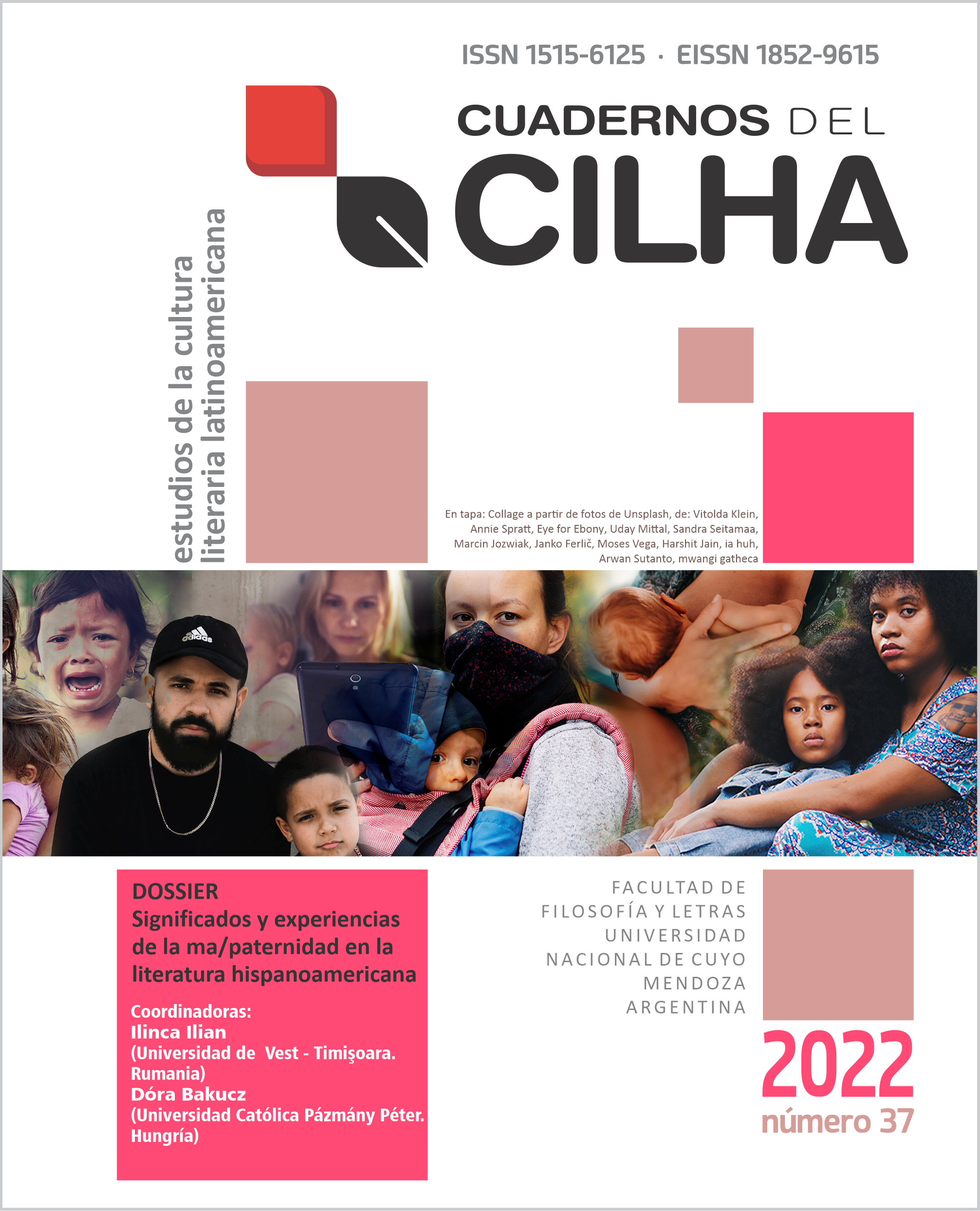Disarming the Philiocentric Discourse.
Figures of Motherhood in Contemporary Latin American Narrative
DOI:
https://doi.org/10.48162/rev.34.050Keywords:
Motherhood, Feminism, Neoliberal model, Diatribe, Contemporary Latin American short storyAbstract
In this article we aim to ponder on a discourse about motherhood that currently claims to become dominant, a discourse based on the concept of intensive motherhood (Hays) that results in the centrality granted to children at the expense of the intimate needs of their procreators and that represents the target of attack in Lina Meruane’s essay Contra los hijos (2014) written in the form of a diatribe. In the first part, we analyze the feminist theoretical assumptions of the Chilean writer’s essay and emphasize its coincidence with the criticisms against the neoliberal maternal model carried out by scholars such as Nancy Fraser (2013), Angela McRobbie and Catherine Rottenberg. In order to better understand its unexpected and deep connections with hatred, eros, pleasure and death, in the second part of this article we intend to put this philiocentric discourse in dialogue with some narrative proposals of contemporary Latin American literature inscribed in the stories “Como una buena madre” ”by Ana María Shua, “Los viejitos” by Patricia Suárez, “Lo que ha comenzado” by Alejandra Laurencich, “Pablito clavó un clavito: una evocación del Petiso Orejudo” and “El niño sucio” by Mariana Enríquez and also “Una historia de éxito” by Alberto Chimal.
References
Badinter, E. (2010). Le conflit: la femme et la mère. Flammarion.
Bauman, Z. (2002). Modernidad líquida. Fondo de Cultura Económica.
Beauvoir, S. de (2005). El Segundo Sexo. Vol. I (A. Martorell, trad.).
Beck, U. y Beck-Gernsheim, E. (2001). El normal caos del amor. Las nuevas formas de la relación amorosa. (D. Schmitz, trad.). Paidós.
Chimal, A. (2018). Manos de lumbre. Páginas de Espuma.
Drucaroff, E. (2011). Los prisioneros de la torre: Política, relatos y jóvenes en la postdictatura. Emecé.
Franco, J. (2015), El arte de vituperar. Cuadernos de Literatura, 19(37), 177-184.
https://doi.org/10.11144/Javeriana.cl19-37.eadf
Fraser, N. (2012). Feminism, Capitalism, and the Cunning of History: An Introduction. HAL Archives-Ouvertes, 17, 1-14. https://halshs.archives-ouvertes.fr/halshs-00725055/document
Fraser, N. (2014). De cómo cierto feminismo se convirtió en criada del capitalismo. Y la manera de rectificarlo (L. Rivera, trad.). Debate Feminista, 50, 131-134. https://doi.org/10.1016/S0188-9478(16)30133-5
García Abreu, A. y Chimal, A. (15 de octubre de 2018). Alberto Chimal: Todos somos narradores. Entrevista con Alberto Chimal, Nexos. https://cultura.nexos.com.mx/?p=16909
Gascón, D. Y Chimal A. (17 de octubre de 2018). Entrevista con Alberto Chimal: Lo que une a mis personajes es su capacidad para el autoengaño. Letras Libres. https://letraslibres.com/literatura/entrevista-con-alberto-chimal-lo-que-une-a-mis-personajes-es-su-capacidad-para-el-autoengano/
Hays, S. (1998). Las contradicciones culturales de la maternidad. (C. Piña, trad.). Paidós.
Ilian, I. (2021). La arquitectura en la prosa de Mariana Enriquez. En Á. Esteban (ed.), Literatura latinoamericana y otras artes (págs. 341-364). Peter Lang.
Kristeva, J. y Vericat I. (1995). El tiempo de las mujeres. Debate Feminista, 11, 343-365.
Laurencich, A. (2017). Lo que ha comenzado. En E. Drucaroff (ed.), El nuevo cuento argentino (págs. 17-22). EUFyL.
Laval, C. y Dardot P. (2013). La nueva razón del mundo: Ensayo sobre la sociedad neoliberal. Gedisa.
McRobbie, A. (2013). Feminism, the Family and the New ‘Mediated’ Maternalism. New Formations, 80, 119-137.
Medina Bravo, P. ; Figueras-Maz, M. y Gómez-Puerta, L. (2014). El ideal de madre en el siglo XXI. La representación de la maternidad en las revistas de familia. Estudios sobre mensajes periodísticos, 20(1), 487-504. https://doi.org/10.5209/rev_ESMP.2014.v20.n1.45244
Meruane, L. (2018). Contra los hijos. Random House Literatura.
Noguerol Jiménez, F. (2020) Matrices violentas: una estética del grotesco. En R. Berroa y M. Á. Pérez Lopez (eds.), El cuerpo hendido: poéticas de la m/p/aternidad (págs. 341-367). Universidad Autónoma de Nuevo León.
Prakash, G. (2010). Noir Urbanism: Distopic Images of the Modern City. Princeton University Press.
Rich, A. (1996). Nacemos de mujer: la maternidad como experiencia e institución. (A. Becciu, trad.). Universitat de València, Instituto de la Mujer.
Richard, N. (1994). La insubordinación de los signos: cambio político, transformaciones culturales y poéticas de la crisis. (A. A. Nelson y S. R. Tandeciarz, trad.). Duke University Press.
Rose, J. (2018). Madres. Un ensayo sobre la crueldad y el amor. Siruela.
Rottenberg, C. (2013). The Rise of Neoliberal Feminism. Cultural Studies, 28(3), 418-437.
Rottenberg, C. (2018). The Rise of Neoliberal Feminism. Oxford University Press.
Shua, A. M. (1988). Como una buena madre. Sudamericana.
Suárez, P. (2017). Los viejitos. En E. Drucaroff (ed.), El nuevo cuento argentino (págs. 83-88). EUFyL.
Tubert, S. (1996). Introducción. En S. Tubert (ed.), Figuras de la madre (págs. 7-37). Cátedra / Instituto de la Mujer.
Winnicott, D. W. (1949). Hate in the Counter-Transference. International Journal of Psychoanalysis, 30(2). 69-74.
Downloads
Published
How to Cite
Issue
Section
License
Copyright (c) 2022 Ilinca Ilian

This work is licensed under a Creative Commons Attribution-NonCommercial 4.0 International License.












































